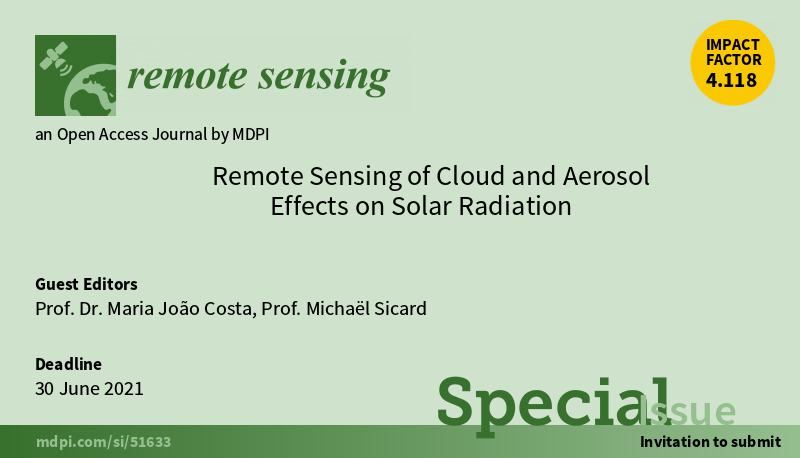Special Issue “Remote Sensing of Cloud and Aerosol Effects on Solar Radiation”
Guest Editor
Department of Physics, Institute of Earth Sciences, School of Science and Technology, University of Évora, 7000-671 Évora, Portugal
Guest Editor
CommSensLab, Dept. of Signal Theory and Communications, Universitat Politècnica de Catalunya, 08034 Barcelona, Spain
Clouds and aerosols constitute the main modulators of solar radiation in the atmosphere through scattering and absorption processes. Since the first assessment of the impact of clouds and aerosols on climate (in the early nineties), these atmospheric constituents continue to contribute with great uncertainty to the estimates and interpretations of the Earth’s energy balance. Specifically, aerosols through their interactions with radiation and with clouds dominate the uncertainty associated with the total anthropogenic radiative effects (radiative forcing). On the one hand, a better understanding of climate change requires an assessment of the radiative effects of clouds and aerosols and a reduction in the degree of uncertainty associated with them. On the other hand, the quantification and understanding of these processes may benefit other research fields as well, like solar energy harnessing. For these reasons, it is considered very pertinent and timely to bring together contributions on this topic in the context of a Special Issue.
This Special Issue welcomes contributions dealing with all aspects of the effects of clouds, aerosols, or aerosol-cloud interactions on solar radiation (at all atmospheric levels; broadband or in a special spectral band of interest from the UV to the near IR), focusing on passive and or active remote sensing from satellite, airborne or ground-based instrumentation. Combination of remote sensing with in situ data and modelling approaches are also encouraged
Manuscript Submission Information
Manuscripts should be submitted online at www.mdpi.com by registering and logging in to this website. Once you are registered, click here to go to the submission form. Manuscripts can be submitted until the deadline. All papers will be peer-reviewed. Accepted papers will be published continuously in the journal (as soon as accepted) and will be listed together on the special issue website. Research articles, review articles as well as short communications are invited. For planned papers, a title and short abstract (about 100 words) can be sent to the Editorial Office for announcement on this website.
Submitted manuscripts should not have been published previously, nor be under consideration for publication elsewhere (except conference proceedings papers). All manuscripts are thoroughly refereed through a single-blind peer-review process. A guide for authors and other relevant information for submission of manuscripts is available on the Instructions for Authors page. Remote Sensing is an international peer-reviewed open access semimonthly journal published by MDPI.
Please visit the Instructions for Authors page before submitting a manuscript. The Article Processing Charge (APC) for publication in this open access journal is 2000 CHF (Swiss Francs). Submitted papers should be well formatted and use good English. Authors may use MDPI’s English editing service prior to publication or during author revisions.
More information here.

